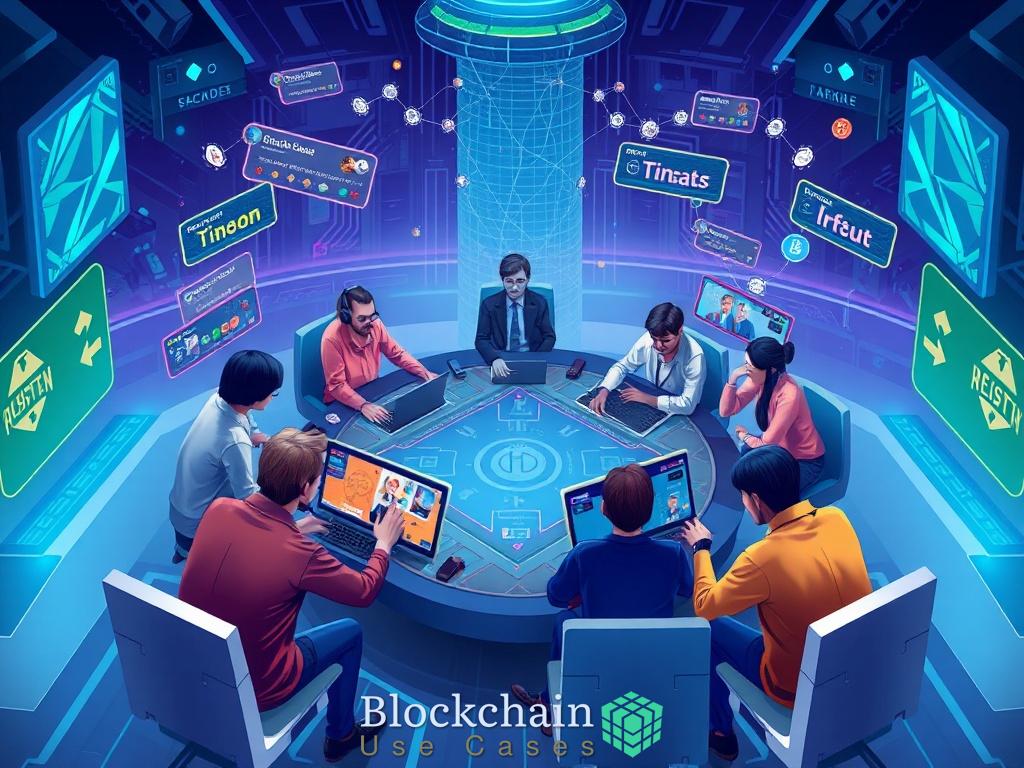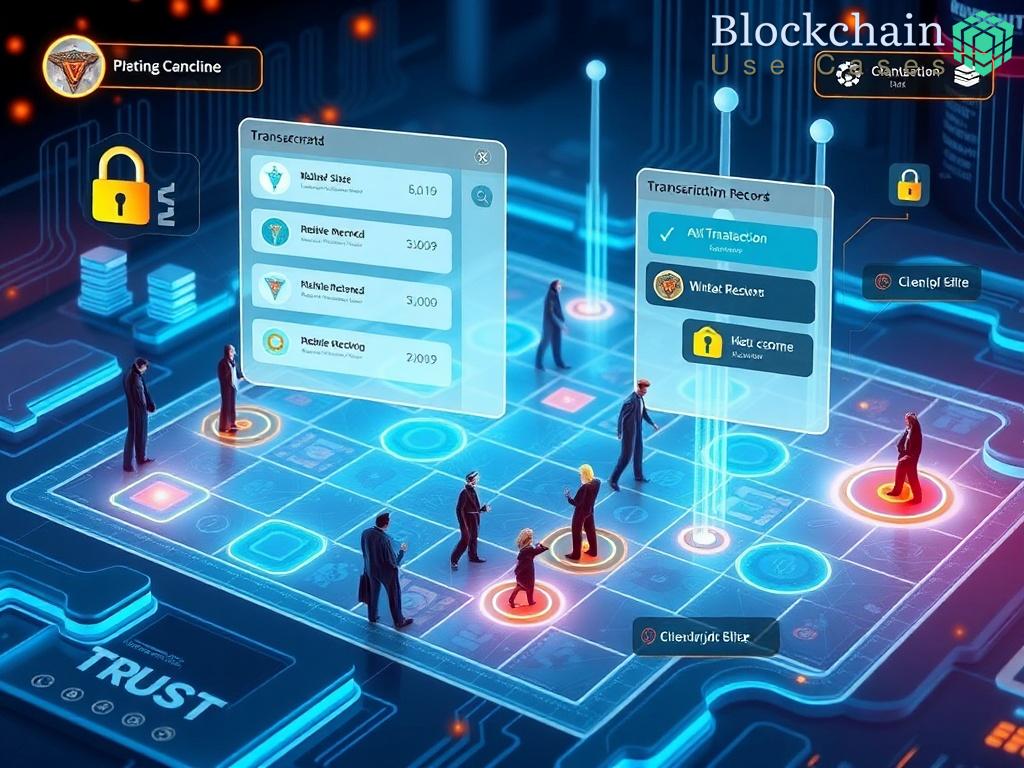Decentralization and Trust in Online Board Games

The Shift Towards Decentralization
In recent years, the gaming industry has experienced a seismic shift towards decentralization, particularly in online board games. This transition is not merely a technological upgrade; it represents a fundamental change in how players interact, trust, and engage with gaming platforms. As more developers embrace blockchain technology, the traditional centralized models are being challenged, leading to a profound impact on trust among players.
Decentralization allows for shared governance, where players can have a say in the rules and operations of the game, thus increasing their sense of ownership and investment. This shift is particularly crucial in online board games, where the fear of unfair advantages or manipulation can deter players from participating.
Building Trust Through Transparency
One of the most compelling advantages of blockchain technology is its inherent transparency. Every transaction, game move, and player interaction can be recorded on an immutable ledger, ensuring that all actions are verifiable and traceable. This level of transparency not only enhances the gaming experience but also significantly bolsters trust among players.
Moreover, the elimination of centralized control diminishes the likelihood of fraud or unfair play, fostering a more secure environment for gamers. When players can independently verify the integrity of the game mechanics and outcomes, their confidence in the platform increases exponentially.
Key Advantages of Decentralized Online Board Games
To summarize the benefits of decentralization in online board gaming, the following list outlines key advantages that enhance player trust:
- Immutability: Once recorded, game moves and outcomes cannot be altered, ensuring fairness.
- Player Governance: Players can influence game rules and features through decentralized voting mechanisms.
- Enhanced Security: Blockchain’s encryption safeguards player data and financial transactions.
- Global Accessibility: Decentralized platforms are often accessible from anywhere, broadening player demographics.
- Community Engagement: Players can form communities and collaborate on game development and improvement.
As the online board gaming landscape continues to evolve, the integration of blockchain technology presents exciting opportunities for enhancing trust and engagement within gaming communities. The benefits of decentralization extend beyond mere gameplay; they foster a collaborative and secure environment that redefines how players perceive and interact with their games.
Smart Contracts: Ensuring Fair Play
Automating Integrity in Gameplay
The advent of smart contracts has revolutionized the way online board games ensure fair play. By utilizing self-executing contracts with the terms of the agreement directly written into code, developers can eliminate ambiguity and enhance the integrity of gameplay. This technology operates on the principles of transparency and automation, guaranteeing that rules are applied consistently without the possibility of human error or bias.
Smart contracts function as impartial referees, overseeing the execution of game rules autonomously. For example, in a turn-based game, a smart contract can automatically determine the validity of a player’s move based on pre-set rules. If a player attempts an illegal action, the smart contract will prevent it from being executed, thus maintaining the integrity of the game.
Benefits of Smart Contracts in Online Board Games
By incorporating smart contracts, developers can offer players a host of advantages that significantly enhance the trustworthiness of online board gaming experiences. Below is a concise list outlining these benefits:
- Impartial Rule Enforcement: Smart contracts ensure that all players are treated equally, with rules enforced consistently without bias.
- Instant Dispute Resolution: In the event of a disagreement, smart contracts can provide pre-defined outcomes based on the game’s rules, eliminating lengthy disputes.
- Transactional Transparency: Players can see the exact conditions and rules governing their interactions, fostering greater trust in the system.
- Reduced Fraud Risks: The automated nature of smart contracts minimizes the risk of fraud or manipulation, creating a secure gaming environment.
- Efficient Game Management: Smart contracts streamline game operations, allowing developers to focus on enhancing gameplay rather than managing rule enforcement.
Smart Contracts vs. Traditional Game Mechanics
To illustrate the transformative power of smart contracts, consider the following comparison between traditional game mechanics and blockchain-based implementations:
| Aspect | Traditional Game Mechanics | Blockchain with Smart Contracts |
|---|---|---|
| Rule Enforcement | Human referees or developers enforce rules | Automated and impartial enforcement through code |
| Dispute Resolution | Manual and often subjective | Pre-defined and objective outcomes |
| Transparency | Limited visibility into game processes | Complete transparency with immutable records |
| Security | Vulnerable to manipulation | Highly secure with cryptographic protection |
As online board games continue to integrate blockchain technology, the role of smart contracts will become increasingly significant in ensuring fair play. By automating rule enforcement and providing transparent processes, smart contracts not only enhance player trust but also create a more engaging and enjoyable gaming environment.
Transparency in Game Mechanics and Player Actions
In the realm of online board games, transparency stands as a cornerstone of trust between players and the platform. As blockchain technology forges new pathways in game development, players are increasingly drawn to environments where their actions and the game mechanics are not shrouded in mystery. Transparency is not just a buzzword; it’s a critical factor that influences player engagement and satisfaction.
Blockchain introduces a paradigm where every action taken within the game can be documented on an immutable ledger. This feature ensures that all gameplay elements, from moves to score tallies, are publicly accessible and verifiable. Unlike traditional gaming systems, where players often grapple with the uncertainty of whether game mechanics are being applied fairly, blockchain empowers players with the ability to independently verify the integrity of the game. This newfound ability fosters a sense of security, as players can trust that the rules are consistently enforced, and that outcomes are determined by actual gameplay rather than arbitrary decisions.
Illuminating the Mechanics Behind Gameplay
The intricate mechanics that govern online board games can often feel opaque, leaving players uncertain about how their actions impact the game. With blockchain, however, each game mechanic is designed to be transparent and traceable. Players can review a complete history of their moves, as well as the corresponding reactions of the game environment. This level of insight not only enhances player confidence but also encourages a deeper understanding of strategy and gameplay dynamics.
Moreover, developers can leverage this transparency to engage with their community more effectively. By providing players with access to data analytics and game performance metrics, developers can invite feedback and suggestions, fostering a collaborative atmosphere. This interaction not only improves the overall gaming experience but also strengthens the bond between players and developers.
Empowering Players Through Accountability
Accountability is a natural byproduct of the transparency that blockchain brings to online board gaming. Players are now equipped with the ability to hold each other accountable for their actions, as all moves are recorded and can be scrutinized. This democratic approach to gameplay encourages fair play and discourages cheating, as the fear of exposure looms large in a transparent environment.
Additionally, the engagement between players also extends to the community level. Players can actively participate in discussions about game rules, mechanics, and potential improvements, making them stakeholders in the development process. This collaborative spirit not only enriches the gaming experience but also enhances the sense of trust and camaraderie among players. As the online board gaming landscape continues to evolve with blockchain technology, the emphasis on transparency will undoubtedly play a pivotal role in shaping the future of player interactions and community engagement.
Immutable Records: Enhancing Accountability
In the rapidly evolving domain of online board games, the introduction of blockchain technology brings forth a new era of accountability through the concept of immutable records. These records serve as a reliable foundation for trust, offering players a transparent view of every action taken within the game. With the ability to audit game history, players no longer rely solely on the integrity of developers or referees; instead, they can independently verify the legitimacy of every move and decision.
The essence of immutable records lies in their resistance to alteration. Once a transaction or game play action is recorded on the blockchain, it becomes part of a permanent digital ledger that cannot be tampered with. This feature is particularly crucial in online board games where the stakes, both financial and reputational, can be high. Players can rest assured that their achievements, losses, and gameplay decisions are accurately documented, fostering a sense of pride and accountability.
Moreover, the presence of immutable records significantly reduces the potential for disputes and misunderstandings among players. In traditional online gaming environments, players often find themselves entangled in conflict over rule enforcement or game outcomes, leading to dissatisfaction and mistrust. However, with blockchain, every move is timestamped and retrievable, allowing for a straightforward resolution process. When questions or conflicts arise, players can swiftly refer to the immutable ledger, which serves as an indisputable reference point.
This level of accountability extends beyond individual players. Developers also benefit from the transparency provided by immutable records. By maintaining a clear record of game mechanics and player interactions, developers can identify patterns of behavior, address potential issues, and enhance the overall gaming experience. Feedback mechanisms are also strengthened, as community input can be directly correlated with specific gameplay events, leading to more informed decisions regarding updates and improvements.
Furthermore, the enduring nature of these records empowers players to take an active role in governance and community building. With access to verifiable data, players can engage in discussions around rule modifications and game enhancements, thus driving a culture of collaboration and shared responsibility. This participatory approach not only enriches the gaming experience but also solidifies the sense of community among players.
As online board games continue to integrate blockchain technology, the role of immutable records in enhancing accountability becomes increasingly apparent. By ensuring that every action is recorded and verifiable, players can enjoy a more secure and trustworthy gaming environment. The impact of this shift is profound, as it not only transforms the way players interact with games but also fosters a deeper connection with the gaming community.
Community Governance: Building Trust Among Players
The evolution of online board games through blockchain technology has not only revolutionized gameplay mechanics but has also redefined how players govern their gaming communities. The decentralization of control and authority empowers players to actively participate in decision-making processes, thereby fostering a robust environment of trust and collaboration. Community governance, facilitated by blockchain, enables players to contribute to the development and evolution of their favorite games, thus enhancing their engagement and loyalty to the platform.
Collective Decision-Making: Empowering Player Voices
At the heart of community governance lies the principle of collective decision-making. Players are no longer passive participants; they become stakeholders in the gaming ecosystem. Through decentralized voting mechanisms, players can express their opinions on various aspects of game design, rule changes, and feature additions. This participatory approach not only democratizes the gaming experience but also instills a sense of ownership among players.
The Role of Decentralized Autonomous Organizations (DAOs)
Decentralized Autonomous Organizations (DAOs) serve as a pivotal framework for community governance in online board games. These organizations operate on smart contracts, allowing players to propose changes, vote on initiatives, and allocate resources for development. By utilizing DAOs, players can ensure that their voices are heard and their contributions are recognized. Furthermore, this structure reduces the risk of central authority manipulation, as decisions are made collectively rather than dictated by a single entity.
Trust Through Transparency and Accountability
Transparency is a vital element that underpins community governance, fostering trust among players. With blockchain technology, every decision made within the governance framework is recorded on an immutable ledger, providing players with the ability to verify the legitimacy of processes and outcomes. This level of transparency not only enhances accountability but also mitigates the potential for disputes, as players can easily reference the governing decisions and their implications.
To illustrate the key aspects of community governance in enhancing trust, consider the following list:
- Engagement: Players actively participate in shaping the game experience, leading to higher satisfaction levels.
- Fairness: Collective decision-making minimizes bias and promotes equitable treatment of all players.
- Responsiveness: The community can quickly adapt to player feedback, ensuring continuous improvement and relevance.
- Security: Transparent governance mechanisms reduce the risk of fraud and manipulation by fostering a sense of vigilance among players.
As online board games continue to embrace blockchain technology, the emphasis on community governance will play a crucial role in building trust among players. By empowering individuals to actively participate in governance structures, the gaming ecosystem transforms into a collaborative environment where trust flourishes, and players feel genuinely invested in their gaming experiences.





